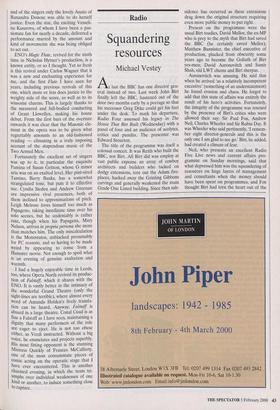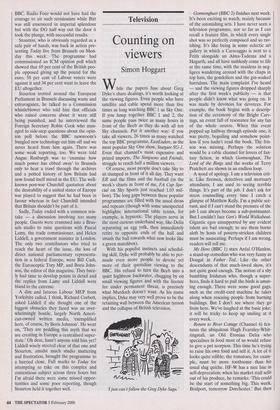Radio
Squandering resources
Michael Vestey
Alast the BBC has one director gen- eral instead of two. Last week John Birt finally left the BBC, hastened out of the door two months early by a peerage so that his successor Greg Dyke could get his feet under the desk. To mark his departure, Radio Four assessed his legacy in The House That Bin Built (Wednesday) with a panel of four and an audience of acolytes, critics and pundits. The presenter was Edward Stourton.
The title of the programme was itself a colossal conceit. It was Reith who built the BBC, not Birt. All Birt did was employ at vast public expense an array of cowboy architects and builders who tacked on dodgy extensions, tore out the Adam fire- places, hacked away the Grinling Gibbons carvings and generally weakened the main Grade One Listed building. Since then sub- sidence has occurred as these extensions drag down the original structure requiring even more public money to put right.
Present on the programme were the usual Birt toadies, David Mellor, the ex-MP who is prey to the myth that Birt had saved the BBC (he certainly saved Mellor); Matthew Bannister, the chief executive of production, plucked from obscurity some years ago to become the Goliath of Birt yes-men; David Aaronovitch and Samir Shah, old LWT chums and Birt sherpas.
Aaronovitch was amusing. He said that when he arrived 'as a relatively incompetent executive' (something of an understatement) he found evasion and chaos. He forgot to add that this state of affairs was entirely the result of his hero's activities. Fortunately, the integrity of the programme was rescued by the presence of Bin's critics who were allowed their say: Sir Paul Fox, Andrew Neil, Charles Wheeler and Sir Robin Day. It was Wheeler who said pertinently, 'I remem- ber eight director-generals and this is the only one I am glad to see go.' Birt, he added, had created a climate of fear.
Neil, who presents an excellent Radio Five Live news and current affairs pro- gramme on Sunday mornings, said that what depressed him was the squandering of resources on huge layers of management and consultants when the money should have been spent on programmes, and Fox thought Birt had torn the heart out of the BBC. Radio Four would not have had the courage to air such revisionism while Birt was still ensconced in imperial splendour but with the DG half way out the door it took the plunge, with successful results.
Stourton, who is obviously regarded as a safe pair of hands, was back in action pre- senting Today live from Brussels on Mon- day this week. The programme had commissioned an ICM opinion poll which showed that 69 per cent of the British peo- ple opposed giving up the pound for the euro, 58 per cent of Labour voters were against it and 34 per cent want to leave the EU altogether.
Stourton trotted around the European Parliament in Brussels discussing waste and extravagance, he talked to a Commission whistleblower who told him that officials who raised concerns about it were still being punished, and he interviewed the Foreign Secretary Robin Cook who man- aged to side-step questions about the opin- ion poll before the BBC newsroom's bungled new technology cut him off and we never heard from him again. There was some weak reporting, too. We were told Angus Roxburgh was to 'examine how much power has ebbed away' to Brussels only to hear a trawl through the archives and a potted history of how Britain had now found itself mired in the EU. The well- known post-war Churchill quotation about the desirability of a united states of Europe was played to suggest that he had been in favour whereas in fact Churchill intended that Britain shouldn't be part of it.
Sadly, Today ended with a common mis- take — a discussion involving too many people. Guests were crammed into a Brus- sels studio to raise questions with Pascal Lamy, the trade commissioner, and Helen Liddell, a government minister in London. The only two contributors who tried to reach the heart of the issue, the loss of direct national parliamentary representa- tion in a federal Europe, were Bill Cash, the Eurosceptic Tory MP, and Boris John- son, the editor of this magazine. They bare- ly had time to develop points in detail and the replies from Lamy and Liddell were bland to the extreme.
A dim and fatuous Labour MEP from Yorkshire called, I think, Richard Corbett, asked Liddell if she thought one of the biggest obstacles they faced was an over- whelmingly hostile, largely North Ameri- can-owned written media, 'exemplified .here, of course, by Boris Johnson'. He went on, 'They are peddling this myth that we are creating in Europe a centralised super- state.' Oh dear, hasn't anyone told him yet? Liddell wisely steered clear of that one and Stourton, amidst much studio muttering and frustration, brought the programme to a hurried close. Full marks to Today for attempting to take on this complex and contentious subject across three hours but I'm afraid there were some missed oppor- tunities and some poor reporting, though Stourton held it together well.



























































 Previous page
Previous page